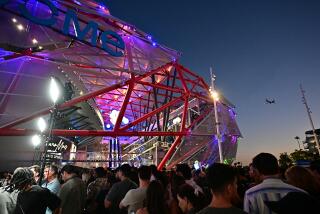By Sound of Judge’s Ruling, Amphitheater Can Continue to Rock
COSTA MESA — Despite new noise limits set by an Orange County Superior Court judge this week, rock bands that play the Pacific Amphitheatre will not have to tone down their acts, amphitheater officials predicted Wednesday.
Pacific officials were upbeat about Judge Richard J. Beacom’s ruling. Neil Papiano, the Pacific lawyer who also owns a 25% share in the amphitheater, hailed the judge’s ruling as “a very fair and enlightened decision.”
Meanwhile, the lawyer for Laurie A. Lusk, the Costa Mesa homeowner who sued the amphitheater over noise, was less than enthusiastic Wednesday. Attorney Richard L. Spix said the noise limits should bring some improvement, but are not strict enough to give the neighbors real peace and quiet on concert nights.
After a two-week trial, Beacom declared on Tuesday that concert noise constituted a nuisance for the Lusk family. He ordered the Pacific to keep the sound down so that levels at the Lusk home about 3,000 feet from the amphitheater will not exceed county noise standards by more than five decibels.
The levels ordered by Beacom “are fair and good, and something that we will be able to comply with,” said Alex Hodges, vice president in charge of West Coast concerts for the Nederlander Organization, the Pacific’s operator.
Under Beacom’s order, the Pacific will be in violation if noise levels at the Lusks’ house rise above 55 decibels for more than a half hour during a given concert hour. Bursts of up to 74 decibels will be allowed for much shorter durations. County marshals, who will monitor noise levels, are to report on compliance in a hearing Beacom set for Nov. 30. Violations would be punishable by contempt-of-court citations against the amphitheater, but the performers would not be subject to punishment.
Spix said the noise case’s outcome should give the Pacific’s neighbors relief from the loudest bands’ most extreme blasts. But he doubted that it will bring quiet.
“I think we won, but we won little,” Spix said. A decision on whether to appeal could depend on how uncomfortable a 55-decibel limit proves to be for the Lusks, he added.
Spix said another possible area of appeal is Beacom’s determination that the Pacific constitutes a “private nuisance” for the Lusks, but not a “public nuisance” for the neighborhood in general. Spix said that legal distinction could undermine the Lusks’ ability to recoup costs and attorney fees from the Pacific’s owners.
Not all of the amphitheater’s neighbors feel that it poses a noise problem, Papiano noted: More than 10 testified on the Pacific’s behalf during the trial.
To find out what the audible impact of the ruling will be, neighbors’ ears, as well as county officials’ decibel meters, will be attuned to the Pacific’s next concert on Aug. 3. The bill features the Allman Brothers Band and George Thorogood and the Destroyers, two full-bore blues-rock acts that pack a hard, heavily amplified punch.
“We will not put any restrictions on” the bands, Hodges said. “It’s the same show they do everywhere else in the country.”
Lusk said Wednesday that she will be listening expectantly. “I hope we do see a reduction in the noise,” she said.
Agents and managers who decide where touring pop acts perform will also be viewing upcoming shows as a test for the Pacific, said Bill Siddons, who manages Crosby, Stills & Nash, a veteran amphitheater draw.
“I would not want to be the first artist to play that place” under the new restrictions, he said. “I would really like to see a few shows go by” and find out from other acts whether the noise limits will mean forced reductions in bands’ sound output.
“You go to a rock show to get fully involved in it physically,” Siddons added. “You really can’t communicate rock at a lower level.” If louder bands find that they can’t play within their preferred decibel range at the Pacific, Siddons said, they will turn to the rival Irvine Meadows.
Hodges said that Irvine Meadows has been able to exploit the Pacific’s noise suit in the two venues’ hotly competitive wrangling to land top touring concert attractions. Now that the legal cloud is gone, he predicted, the Pacific’s competitive position should improve. According to testimony in the noise case, the Pacific had losses of more than $2 million in 1989.
A recent attempt by the Pacific to end the competition by merging with Irvine Meadows was blocked last week when the U.S. Justice Department brought an antitrust suit alleging that joint operation of the venues would create an illegal concert monopoly in Orange County. A subsequent sale of a part-interest in Irvine Meadows to other bidders ensured that ownership would remain separate, and that the county’s heated amphitheater war would continue.
More to Read
Sign up for Essential California
The most important California stories and recommendations in your inbox every morning.
You may occasionally receive promotional content from the Los Angeles Times.











